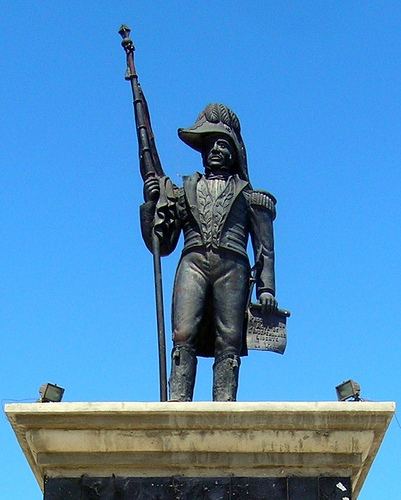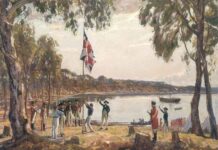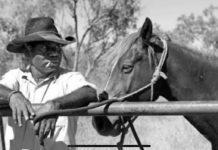 Recently an Associate Professor at Drexel University and self-described communist, George Ciccariello-Maher, outed himself with his ‘White Genocide’ tweet. Just in case people doubted his support for race-motived murder, he backed it up with a second post clarifying that the 1804 Haiti massacre of around 5000 French men, women and children was ‘a good thing indeed’.
Recently an Associate Professor at Drexel University and self-described communist, George Ciccariello-Maher, outed himself with his ‘White Genocide’ tweet. Just in case people doubted his support for race-motived murder, he backed it up with a second post clarifying that the 1804 Haiti massacre of around 5000 French men, women and children was ‘a good thing indeed’.
Okay.
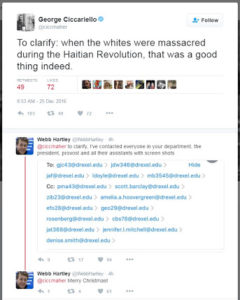 Following this, Ciccariello-Maher has attempted to bluff his way out of the comment, and a quick Google search will show ample evidence of the usual left-leaning suspects calling him comrade and attempting to defend his comments using the ‘Freedom of Speech’ banner.
Following this, Ciccariello-Maher has attempted to bluff his way out of the comment, and a quick Google search will show ample evidence of the usual left-leaning suspects calling him comrade and attempting to defend his comments using the ‘Freedom of Speech’ banner.
However, let us not talk about Ciccariello-Maher. Let us talk about Haiti, or at least in the historical context, let’s talk about Saint-Domingue. In the 18th century Saint-Domingue was under French rule and, like many of the countries in the region, deeply connected with the exploitation of humans in order to supply European nations with their desires. In Saint-Domingue the export crop was sugar, and the labour, forcefully imported African slaves.
In 1789, the French Revolution and its perceived implications swept onto the scene. The oppressed and often brutally-treated slaves saw the Déclaration des Droits de l’Homme et du Citoyen (Declaration of the Rights of Man) as a means for their freedom, while the land-holders saw the revolution as a chance to increase their personal power. In addition, the substantial population of non-white free citizens were pushing for civil equality. While initially the conflict was restricted to the various factions of free citizens of all ethnicities over their perceived civil and legal rights granted by the new French Constituent Assembly, by August 1791 the slaves had also risen in open revolt.
Foreign powers, of course, reacted with massive degrees of self-interest. America, who at this time in their history still had their own significant slavery investment, mostly played each side off against the other in an attempt to weaken both. France wished to protect its colony and suppress the rebellion and England found itself at war with France by 1793.
People died.
By 1798, from a European point of view, things were effectively over. No one could maintain the political interest or need to remain in conflict, and thus they withdrew, leading to a period referred to as the War of the Knives where the non-white faction of Toussaint Louverture fought the non-white faction of André Rigaud.
People died.
Toussaint won, more people died as he ordered reprisals against Rigaud’s supporters, and Toussaint invaded Santo Domingo on the Spanish half of the island.
In 1802, France regained the political interest and need, and returned with an expeditionary force. The French had some military success but the real victor was yellow fever.
People died.
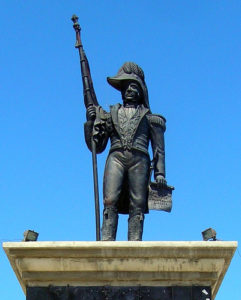
In 1803, England was once again at war with France, and with the Royal Navy effectively removing any chance of support from Europe, the remaining forces were defeated, terms were agreed upon, and in January 1804, revolution leader Jean-Jacques Dessalines renamed the place Haiti and was elected by his fellow commanders as Governor-General.
The revolution was now effectively over.
Which is when Dessalines then ordered the total extermination of all remaining native French.
With few exceptions, every French white, regardless of age or sex, was killed. His forces were at first reluctant to carry out the murders, and Dessalines himself spent February and March systematically travelling from city to city to ensure the killings were enforced. Amnesty was then offered to any survivors that may have been in hiding and they were murdered as well. Women were not spared. If they survived it was believed they may have given birth to new Frenchmen, so they were either raped and then murdered, or just plain murdered.
In all, five thousand men, women and children were put to death.
A good thing indeed?
What did it really achieve? Dessalines already ruled Haiti and totally removed European interference. He ruled it so much that later that year he declared himself Emperor as well. The killings didn’t even improve the overall quality of the population’s lives. With the country largely in ruin, Dessalines decided to reform its economy by abolishing private ownership, binding most of the population as labourers to a set plantation, and drafting the rest – up to 10% of the available men – into the army.
True, it was no longer technically slavery, for Dessalines shortened the working day and banned use of the whip. The new labouring class no doubt appreciated this gesture, probably up until the moment the overseers simply started beating them with something else.
Dessalines himself didn’t last that much longer. By 1806 internal revolt was once more simmering and he was killed by rivals.
Once again, people died.
Also once again, what good was the murders? Foreign slave-owning nations saw the act as a warning, reacting by further oppressing their slaves’ lives out of fear for their own. The Haiti slaves moved from being oppressed and controlled to being oppressed and controlled, with the new army-backed elite now sitting on the top of the social pyramid. The country struggled along. Freed American slaves were encouraged in the 1820s to emigrate. Most hated the conditions and soon returned to the United States.
In 1825 France returned with a fleet, effectively extorted the nation to the tune of 150 million francs and then left them to their independence. This debt did little to lift the fortunes of the country or help provide political stability. In 1914 the Americans sent in the Marines, and the country then spent from 1915 to 1934 effectively a US puppet. Even today Haiti is not a successful nation. On the other side of the island, the Dominican Republic has a similar population but eight times the GDP.
Racially murdering five thousand people in 1804 did absolutely nothing to improve the lives of black slaves in Haiti. If anything, it increased fear amongst overseas slave owners, promoted the belief that blacks were nothing but murderous savages who were not to be trusted, and suppressed support for emancipation.
George Ciccariello-Maher and his defenders are correct; he is completely within his freedom of speech rights to claim whatever he wishes.
We, however, are completely within our rights to question him.
Haiti.
People died.
Black. White. Mixed. They died.
A sad and tragic thing indeed.
Photo by le Korrigan 

